
Will you soon attend an appointment to get a dental crown in Lebanon? Your new restoration will protect your tooth, provide benefits for your oral health, and perhaps even enhance your smile’s appearance. Still, you might feel a little nervous about your upcoming procedure. Will you have to go through a painful or lengthy recovery period? Fortunately, most patients enjoy a smooth and relatively easy post-treatment experience. This blog post discusses what you can expect after your crown is placed.
Numbness from Anesthetic
At least a portion of your mouth is likely to be numbed during your dental procedure. The numbness may stick around for several hours. Until it wears off, you should not eat anything too hot; it would be easy to accidentally burn your mouth. Testing the temperature of foods with your lips can help you determine whether they are safe to eat.
After the Anesthetic Wears Off
After any local anesthetic wears off, you might notice some sensitivity and soreness in your mouth. A degree of swelling is also common. These symptoms usually disappear after a few days or a few weeks. In the meantime, you can manage any discomfort by taking a few practical steps:
- Take an OTC pain medication if necessary. Many patients find that ibuprofen works well.
- Apply a topical anesthetic to the gums. The cement that your dentist used to secure your crown onto your tooth might cause a bit of irritation. An OTC oral anesthetic can be applied topically to soothe the discomfort.
- Adjust your diet. It may be best to consume only liquids and extremely soft foods for a few days after your appointment. Things like soups, scrambled eggs, smoothies, and mashed potatoes are good choices.
After Your Recovery Period
After any swelling and soreness or gone, you can go back to your normal eating and drinking habits. Some individuals hesitate to test their new crown with tough or crunchy foods, but remember that your restoration was designed to be durable. It is unlikely that you will damage it by eating things like crackers, chips, and chewy meats.
Of course, taking care of your crown is important. Avoid biting down on extremely hard items, such as ice, that might chip or break your restoration. You should also adhere to a thorough oral hygiene routine and visit your dentist twice a year for a checkup and cleaning.
What if You Encounter a Problem?
If you have any questions or concerns during your recovery, call your dentist. Things like severe pain, a loose-feeling crown, and signs of infection are not normal and should be addressed promptly. Your dentist will take quick action to relieve your discomfort and correct any issues with your crown.
The placement of dental crowns is a routine procedure that usually goes smoothly without any problems. Very soon after your procedure, you can expect to begin fully enjoying the benefits of your brand-new restoration.
Meet the Practice
The team at Santavicca Dental Professionals proudly provides a full range of oral health treatments, including same-day crowns and a range of other types of restorations. If you would like to know more about how our practice may be able to serve you, contact us at 603-215-7108.
